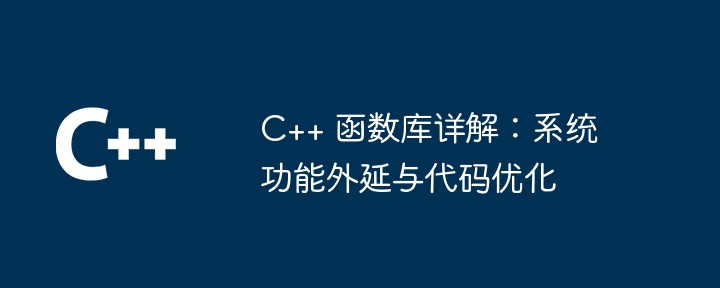

Detailed explanation of C function library: system function extension and code optimization
Introduction
C function Libraries are collections of predefined functions that extend the functionality of the C language and enhance its capabilities and ease of use. These libraries cover a wide range of functionality, from input/output operations to complex algorithms. By leveraging function libraries, developers can save time, reduce code redundancy, and write simpler and more efficient programs.
1. Input/output function library
<iostream>: Provides standard input/output stream<fstream>: used for file input/output<iomanip>: control output format<cstdio> ;: C language compatible input/output functionPractical case: reading and printing integers from a file
e737d6f8ef719d9661a151ccb1b882105. Other function libraries
<chrono>: Time and date operations <filesystem>: File system operations <thread>: Multi-threaded programming<memory>: Memory managementOptimize code through function library
Function library Provides pre-implemented code as an alternative to custom solutions. This can significantly reduce code redundancy and improve readability and maintainability. In addition, the function library is optimized to be fast and efficient, thereby improving the performance of the application.
Conclusion
Function libraries are a powerful addition to the C language, providing developers with a wide range of functionality. By taking advantage of function libraries, you can extend the capabilities of C and write simpler and more efficient programs.
The above is the detailed content of Detailed explanation of C++ function library: system function extension and code optimization. For more information, please follow other related articles on the PHP Chinese website!
 What are the differences between c++ and c language
What are the differences between c++ and c language
 Recommended learning order for c++ and python
Recommended learning order for c++ and python
 Cost-effectiveness analysis of learning python and c++
Cost-effectiveness analysis of learning python and c++
 Is c language the same as c++?
Is c language the same as c++?
 Which is better to learn first, c language or c++?
Which is better to learn first, c language or c++?
 The difference and connection between c language and c++
The difference and connection between c language and c++
 C++ software Chinese change tutorial
C++ software Chinese change tutorial
 Cost-effectiveness analysis of learning python, java and c++
Cost-effectiveness analysis of learning python, java and c++




